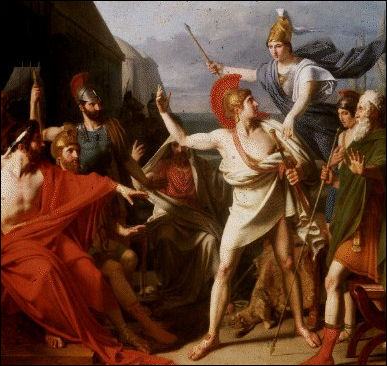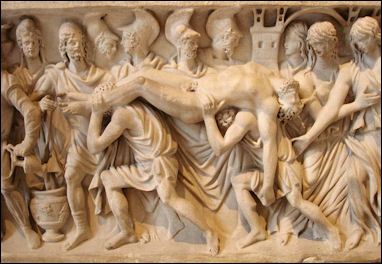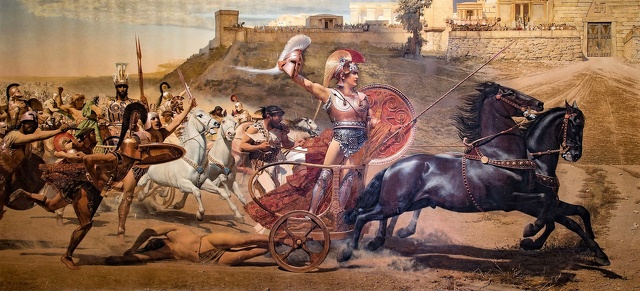Home | Category: Literature and Drama
ACHILLES AND HECTOR
In The Iliad by Homer, Caroline Alexander wrote in National Geographic: The climactic battle to which all the epic action has been driving is the ferocious duel between the Greek Achilles and the Trojan Hector. Despite their very different personalities, the two men share general traits. Both are noble; Achilles is the son of a goddess and the king of Thessaly. Hector is the son of the king and queen of Troy. Both are the outstanding warriors of their respective armies. Both men are young and honorable in their different ways, and both men, as the epic takes pains to show, want desperately to live. [Source: Caroline Alexander, National Geographic, February 20, 2021]
For both, their final confrontation is highly personal. Achilles’ devastation of the Trojan army and its allies claimed the lives of Hector’s own brothers and brothers-in-law. Hector in his turn has slain Achilles’ closest comrade, Patroclus. And, improbably, the two heroes also briefly share a spectacular set of armor. How Hector came to wear it and the consequences of his doing so, accounts for one of the most dramatic themes in the entire epic.
Greek Achilles, also called Pelides, was the son of the mortal king Peleus (king of Phthia and Hellas in Thessaly) and the goddess. Thetis. He was the leader of the Myrmidons beginning at 15.
Hector was a Trojan prince and the greatest fighter for Troy in the Trojan War. As the first-born son of King Priam and Queen Hecuba, who was a descendant of Dardanus and Tros, the founder of Troy, and the heir apparent to his father's throne. He acted as leader of the Trojans and their allies in the defence of Troy, "killing 31,000 Greek fighters". Homer’s Hector is peace-loving, thoughtful as well as bold. He is a good son, husband and father, and without darker motives. +
RECOMMENDED BOOKS:
“The Iliad” translated by Alexander Pope (1688-1744) was a great influence on Keats and others. Amazon.com;
“The Iliad” translated Stanley Lombardo (1997) is regarded as the most accessible translation. Amazon.com;
“The Iliad” (Penguin Classics) translated by Robert Fagles is also supposed to be good. Amazon.com;
“Homer: Poet of the Iliad” by Mark W. Edwards (1990) Amazon.com;
“Troy: The Greek Myths Reimagined” by Stephen Fry (2021) Amazon.com;
“Troy: Our Greatest Story Retold” by Stephen Fry (2020) Amazon.com;
“Aeneid” by Virgil (19 BC), has the Trojan Horse story Amazon.com;
“The Song of Achilles” by Madeline Miller (2011), Novel Amazon.com;
“Lord of the Silver Bow” Novel in Troy by David Gemmell (2005) Amazon.com;
“A Thousand Ships”, Novel by Natalie Haynes (2019) Amazon.com;
“Helen of Troy: Goddess, Princess, Whore” by Bettany Hughes (2005) Amazon.com;
“Helen of Troy”, Novel by Margaret George (2006) Amazon.com;
“History and the Homeric Iliad” by Denys Page (1959) Amazon.com;
“From Hittite to Homer: The Anatolian Background of Ancient Greek Epic” by Mary R. Bachvarova (2016) Amazon.com;
Achilles
The main character in the “Iliad” arguably is Achilles, a great warrior given special protection because his mother, the sea nymph Thetis, dipped him in the River Styx. In the “Iliad “ he returns to Troy to pursue an everlasting fame that he can attain only if he dies on the battlefield. Even though he is described as "swift-footed and brilliant Achilles" and is considered the greatest of all Greek heroes he comes across as a vengeful hot head while his rival Hector is depicted as a loving husband and good citizen. Stories surrounding Achilles are based partly on the “Iliad” but also on other Greek and Roman sources.
Caroline Alexander wrote in National Geographic: Because his mother was godess, Achilles is a demigod, a cut above all the other heroes in whom no divine blood, or ichor, flows; and yet, like them, he is mortal. Nonetheless, his close relationship with the Olympian gods brings him advantages. His mother has direct access to Zeus, the king of the gods, and can ask favors of him for her son, bypassing the usual route of offering up prayers. [Source: Caroline Alexander, National Geographic, February 20, 2021]

Wrath of Achilles
The “Iliad” opens with the lines:
“Wrath? sing, goddess, the accursed wrath of Achilles,
son of Peleus
Which placed countless suffering on the Achaeans.
And hurled so many strong souls of heroes to Hades,
but made their bodies the spoil of dogs
And all the birds; and so the plan of Zeus was
accomplished.”
In some tellings of the Achilles story the hero not only came close to being a god but also came close to dethroning Zeus to the rule the heavens, almost overthrowing Zeus the same way he overthrew his own father, the titan Kronos. Zeus was very interested in Achilles’s mother Thetis until her learned that she had been fated to bear a son stronger than her father and averted a challenge to his dominance by marrying her against her will to the mortal Peleus, Achilles father.
Achilles also has to choose between a life that is short but glorious and one that is long but forgotten. He spent most of his in his Greek homeland of Phthuam which means something like “Waste-Away Kabd” in Greek. And even though Apollo played his lyre at Achilles wedding he is the hero’s nemesis and fated killer.
Achilles’s Heel?
Ward Hazell wrote in Listverse: Achilles was was raised by a centaur. His birth was preceded by a prophecy that he would be stronger than either Zeus or Poseidon. Consequently, he was a marked man. His mother decided to train him to be a fearless warrior.In order to make him immortal, she dipped him in the waters of the River Styx, thereby making his whole body invulnerable, except for the heel by which she had held him. Later, Achilles was killed by being shot in the heel with a poisoned arrow. [Source Ward Hazell, Listverse, August 31, 2019]
However, Achilles’s heel was not his actual heel. His Achilles Heel was his pride, and the whole heel thing was actually just a metaphor. Hearing that Achilles had been prophesied to die at Troy, his mother, who was more of a hindrance than a help, commissioned a sword and shield to be made for him by the blacksmith to the gods, Hephaestus, and while they were super-strong, they were also extremely distinctive and marked Achilles out to his enemies.
In the Iliad, Homer describes Achilles as proud and vengeful. He led his army into battle against Troy, but when Agamemnon, king of Mycenae and brother of the king of Sparta, gave away Achilles’s wife as part of a peace deal, Achilles refused to fight anymore.
Achilles Armor and Divine Warhorses
Caroline Alexander wrote in National Geographic: On the battlefield, Achilles is equipped like no other. His divine warhorses, a wedding gift from the god Poseidon to his father, were sired by the west wind. His trademark ash-wood spear, which no other hero is strong enough to wield, was a wedding gift to his father from the centaur Chiron. He possesses “stupendous armor, a wonder to behold, / a thing of beauty; the armor the gods gave to Peleus” (Il. 18.83-84), yet another wedding gift. [Source: Caroline Alexander, National Geographic, February 20, 2021]
Of all the weapons described, nothing compares to the armor of Achilles, who possesses two sets of armor in the epic. Each one is peerless and corresponds with two distinct stages of his engagement with the war. First, as the Greeks’ most fearsomely effective combatant;second, when he withdraws from the fighting.
At one point in The Iliad action on the field of war stops, and the epic follows his mother Thetis to the divine workshop of Hephaestus, master smith for the gods. In the bustling magical workshop, with its great bellows and ingenious mechanical attendants, Hephaestus forges Achilles’ brilliant new armor. With its creation, Achilles crosses a landmark line in his own life. The armor that his mother has entreated for his protection is in fact a token of his approaching death. All this is known to Hephaestus. He will create the most splendid armor any mortal man has ever worn, but, as he tells Achilles’ mother, it will not save her son’s life:
Would that I were so surely able to hide him
away from death and
its hard sorrow,
when dread fate comes upon him,
as he will have his splendid armor, such as
many a man
of the many men to come shall hold in wonder,
whoever sees it. (Il. 18.464-467)
Pouring all his skill into the work, Hephaestus creates a magnificent helmet, breastplate, and greaves, but his masterpiece is the shield:
And on it
he wrought with knowing genius many
intricate designs.
On it he formed the earth, and the heaven,
and the sea,
and the weariless sun and waxing moon,
and on it were all the wonders with which the
heaven is ringed (Il. 18.482-485)
On it too are depictions of cites and the life within them, weddings, counsels, shepherds with their flocks, farms, and vineyards. In short, the shield that Achilles will carry into war bears upon it all the variety of life he will shortly lose.
Hector Kills Patroclus with the Help of Apollo
Heroism by Patroclus, Achilles’ friend, resulted in the desired respite for the Greeks — but also leads to his death, which is greatly assisted by the god Apollo, an unyielding champion of the Trojans:
Cloaked in thick mist Apollo met him,
then stood behind and struck the back and
broad shoulders of Patroclus
with the flat of his hand; so that his eyes spun.
From his head Phoebus Apollo struck the helmet;
and rolling beneath the horses’ hooves it rang
resounding,
four-horned, hollow-eyed, the horsehair
crest defiled
with blood and dust. Before this it was
forbidden that
the horsehair-crested helmet be defiled by
dust,
for it had protected the handsome head and
brow of the god-like man
Achilles; but now Zeus gave it to Hector
to wear on his head; but his own death was
very near.
In Patroclus’ hands the long-shadowed spear was wholly
shattered,
heavy, massive, powerful, pointed with bronze;
from his shoulders
his bordered shield and belt dropped to the
ground;
then lord Apollo, son of Zeus, undid his breastplate.
Confusion seized his wits, his shining limbs
were loosed beneath him,
Patroclus stood stunned. Behind him, in his
back, between his shoulders,
a Trojan man struck with a sharp spear
at close range (Il. 16.790-807)
Struck first by a god and then by a Trojan man, rendered utterly vulnerable, Patroclus attempts to retreat but is caught and slain by Hector, who vaunts over the dead man — and strips him of his armor. A bitter fight ensues between Achaeans and Trojans for this great prize, and at length the Trojans prevail. Hector is quick to exchange Achilles’ armor for his own — an act of hubris that causes Zeus, who is watching from the heights of Olympus, to shake his head in disapproval. [Source: Caroline Alexander, National Geographic, February 20, 2021]
Achilles Retires From the Battlefield But Then Changes His Mind After Patroclus's Death
At one point in The Iliad Achilles withdraws from the fighting in a rage after his commander in chief Agamemnon confiscated his war prize, a woman named Briseïs, whom Achilles claims to love. Caroline Alexander wrote in National Geographic:Most remarkable, it seems Achilles has a choice of fates, which is revealed when his comrades come to his quarters to beg him to return to battle. Achilles refuses, and in a momentous speech he declares that he knows he will lose his life if he returns:

Hector brought back to Troy For my mother tells me, the goddess Thetis of the silver feet,
that two fates carry me to death’s end;
if I remain here to fight around the city of the Trojans,
my return home is lost, but my glory will be undying;
but if I go home to the beloved land of my father,
outstanding glory will be lost to me, but my life will be long. (Il. 9.410-45)
Back at the Achaean camp, Achilles learns of Patroclus’s death. Instantly his anger with Agamemnon evaporates, and he is filled with sorrow for his fallen friend and rage at Hector. Bent on revenge, he declares he will return to the fighting and asks his goddess mother to obtain new armor. With this request, Achilles takes a decisive step on the path that leads inexorably to the fate he once sought to avoid — an early death. [Source: Caroline Alexander, National Geographic, February 20, 2021]
Battle Between Hector and Achilles
After fighting for nine years, Achilles gets into an argument with Agamemnon and withdraws from the battle in a burst of anger, with disastrous results for the Greeks, only to re-enter after his best friend Patroclus is killed by Hector and he seeks vengeance.
Achilles got his revenge against Hector, killing him at the gates of Troy by stabbed him in the throat. "Hector made his swoop, swinging his sharp sword, and Achilles charged," wielding a "bronze barbed ash spear," Homer wrote. "Achilles charged against him, his heart filled with savage fury. In front of his chest he held the covering of his lovely decorated shield, and the bright [embossed] helmet nodded on his head....Achilles drove in there with his spear as Hector charged him, and the point went right through his soft neck....He crashed in the dust, and god-like Achilles triumphed over him.”
From a tower the elderly King Priam gazed upon the battlefield and observed “the monstrous Achilles, and the Trojans being driven in utter panic before him, with no spirit left in them.” Achilles denied Hector's pleas to be buried inside the gates of Troy. Instead, he was said to have shown his contempt by dragging the body behind his chariot with Hector's "dark hair falling about him," and tossing it on a rubbish heap. [Source: Joshua Hammer, Smithsonian magazine, March 2022]
Homer does not describe Achilles’s death in the Iliad, but later legends embellished the tale by saying that Hector’s brother, Paris, avenged his death by shooting Achilles with a poison arrow in the heel, with Apollo guiding the arrow to the one vulnerable spot in one of his heels, the only part of his body that that is unprotected because his mother held him there when he was dipped in the River Styx. Achilles heel has come to mean a point of vulnerability. The “ Iliad” ends with Hector's funeral. On the plains of Troy are more than 40 burial mounds that are said to belong to heroes from the Trojan War. Among them is a tumulus that reportedly belongs to Ajax.

Achilles in his chariot, dragging the body of Hector, late 19th-century fresco by Franz von Matsch (1861–1952)
Image Sources: Wikimedia Commons, The Louvre, The British Museum
Text Sources: Internet Ancient History Sourcebook: Greece sourcebooks.fordham.edu ; Internet Ancient History Sourcebook: Hellenistic World sourcebooks.fordham.edu ; BBC Ancient Greeks bbc.co.uk/history/; Canadian Museum of History, Perseus Project - Tufts University; perseus.tufts.edu ; MIT Classics Online classics.mit.edu ; Gutenberg.org, Metropolitan Museum of Art, National Geographic, Smithsonian magazine, New York Times, Washington Post, Live Science, Discover magazine, Natural History magazine, Archaeology magazine, The New Yorker, Encyclopædia Britannica, "The Discoverers" and "The Creators" by Daniel Boorstin. "Greek and Roman Life" by Ian Jenkins from the British Museum, Wikipedia, Reuters, Associated Press, The Guardian, AFP and various books and other publications.
Last updated September 2024



